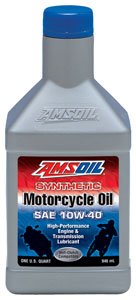Amsoil is not a full synthetic it is 100% synthetic.Does anyone in really know the difference between the full and the 100%?
Not sure if your question is straight up or rhetorical. I'll treat it as the former.
After the Castrol vs Mobil 1 lawsuit decision, this has become a very murky subject.
Before the lawsuit an oil had to be specifically 'Engineered' at the refining stage to be called 'Synthetic', which Mobil 1 (and a few others) were.
Castrol started taking standard, Type III mineral based oil and combining it with an additive package. Kind of like taking standard oil and adding Slick 50 or STP to it. A bit crude but it gets the general point across. Castrol marketed this product as 'Synthetic'. Since this required a less expensive production process, Castrol was able to sell this oil for less than the True Synthetics like Mobil 1, Amsoil, etc.
So, Mobil 1 sued Castrol for misleading marketing and false advertising. At the time everyone thought it was a slam dunk for Mobil 1 since it was considered ridiculous that a non-synthetic oil could be marketed as 'Synthetic'. But, to the surprise of many, Castrol prevailed. So now you have 2 very different oils both being marketed as 'Synthetic'. Very confusing. This is only legal in the US. No other country allows a Castrol like product to be marked as 'Synthetic'.
The quality of what I call Doctored Dyno Oil depends on the additive package which is designed to protect the inferior Type III mineral oil because it breaks down too quickly. When the additive package goes away, so does your lubrication. Some additive packages are very good. Others are not. But they will all be sold as 'Synthetic'.
Since engineered synthetic oils like Mobil 1 and Amsoil are much stronger, they need little or no additives or modifiers.
All of today's modern oils are light years ahead of lubricants from the past. And a good thing too because the stress placed on lubricants from today's power plants is much greater than in the past. Most any 'Synthetic' oil will do a good job regardless of which method of production is used as long as you change it frequently enough.
Typically, a Type IV, engineered synthetic will out last and out lubricate a Type III additive package synthetic oil.

